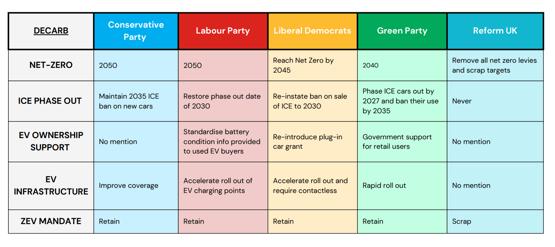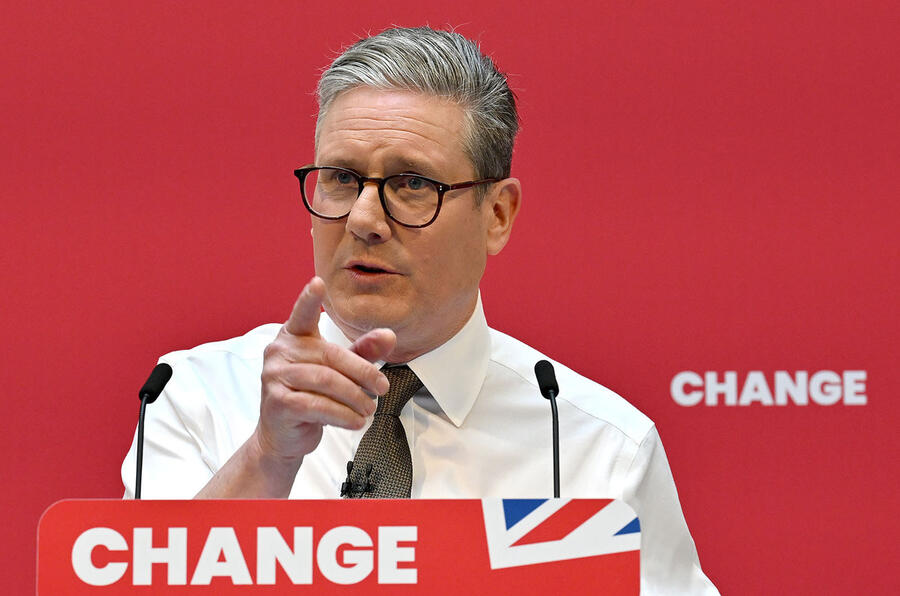As an employer of 78% of the 758,000 people working in the sector and which generates annual turnover of £100 billion, automotive retailers will now focus on how Labour plans to addresses the factors which most impact their business – and just as importantly, the speed at which it will deliver.
Labour was in fact the only party with a dedicated automotive policy which recognised the contribution the motor industry will likely play in achieving net zero goals.
Mike Hawes, chief executive of the Society for Motor Manufacturers, signalled its support for a bespoke approach to achieving net zero which, with the right conditions, could also deliver economic growth.
As an employer of 78% of the 758,000 people working in the sector and which generates annual turnover of £100 billion, automotive retailers will now focus on how Labour plans to addresses the factors which most impact their business – and just as importantly, the speed at which it will deliver.
Labour was in fact the only party with a dedicated automotive policy which recognised the contribution the motor industry will likely play in achieving net zero goals.
Mike Hawes, chief executive of the Society for Motor Manufacturers, signalled its support for a bespoke approach to achieving net zero which, with the right conditions, could also deliver economic growth.
"The new government’s commitment to an industrial strategy and its already published Automotive Sector Plan can boost manufacturing competitiveness, enhance trade relations and support consumers," he said.
Ahead of the upcoming General Election, the Labour Party had promised to reintroduce the ban on the sale of new internal combustion engine (ICE) cars starting from 2030.
Industry will no doubt welcome the restoration of the 2030 date change in regards to the ban on new petrol and diesel sales even though manufacturers and broader industry are already working towards this date under the Zero Emissions Mandate. Even so, the general consensus is that it makes sense to align consumer expectations providing them more certainty.
National Franchised Dealers Association (NFDA) which represents car and commercial retailers across the UK in fact surveyed its members to gather dealer opinions on the most important issues their businesses would like to see tackled by the next government.
Top of the list of concerns was the slowing demand in EVs and meeting ZEV mandate targets with 69% ranking this as their first choice with the ongoing skills shortage and EV charging infrastructure following behind.
No surprise then that 44% of dealers said the next government should prioritise stimulating the private electric vehicle market.
NFDA chief Sue Robinson said it will immediately engage with the new Labour government on these key issues, reaching out to ministers as the new Cabinet begins to form.
Road pricing, unfair regulations for heavier, electric vans, HGV MOT capacity and business rates will also feature high on the NFDA agenda.
“The next few months and years will be pivotal for our industry,” she said. “It is essential that the new government works with NFDA and the automotive sector throughout the UK to offer robust support on these key issues while unlocking the dynamic potential of this sector.”
Labour had also pledged to accelerate the deployment of EVs, by expanding charging infrastructure and standardising information on the condition of second-hand batteries.
Industry is supportive of Labour’s manifesto commitments to standardise battery information, given battery health worries are proving a blocker for some consumers considering making the switch.
Kevan Wooden, CEO at LKQ UK & Ireland, said he would welcome the fresh policy perspective that Labour could bring.
“Starmer’s plans to restore the 2030 phase-out date for new cars with internal combustion engines (ICE) will have the most immediate impact on the industry,” he said.
“Some in the aftermarket had delayed investment plans for retooling and reskilling, but it will now be imperative for garages to kickstart their transition as to not miss out on EV custom.”
“The introduction of a standardised battery health certification scheme for used vehicles under Labour could also represent a new income opportunity for garages, incentivising them further to upskill and retool for servicing plug-in vehicles sooner rather than later. Garages and workshops eagerly anticipate more details on the scheme.”
Despite these promises, however, Labour's manifesto made no mention of reinstating the plug-in car grant, which had been axed by the Conservative government – an omission which had drawn criticism from stakeholders such as the RAC motoring organisation which insisted that financial incentives remain crucial to drive EV adoption.
In order to hit the reinstated 2030 zero-emission target, the RAC has repeated its call on the new government to reintroduce grant support aimed at stimulating the cheaper end of the new car market to make going electric more affordable.
It is further calling on it to reduce VAT on public EV charging from 20% to match the 5% levied on domestic electricity so those who can’t charge at home aren’t disadvantaged.
Targeted financial incentives on used electric cars are also needed to support greater adoption, according to Ian Plummer, commercial director at Auto Trader, who also urged the new government to maintain the existing salary sacrifice and BIK incentives to support the new electric car market. Greater transparency on changes in road pricing and taxes for electric cars would also allow consumers to plan for the future.
“All too often in the recent past,” Plummer said, “we’ve seen short term political advantage prioritised at the expense of the serious long-term decision-making the country needs to meet net zero goals. Given the size of their mandate, we’d like to see Labour do more to support the transition to greener vehicles.”
He said supporting the industry to install more chargers by speeding up planning and encouraging more creative ways to charge EVs near people’s homes was a further priority.
The industry will also want to learn how the EV skills gap can be plugged through Labour’s proposed body Skills England.
Stuart James, chief executive of the Independent Garages Asociation, on this noted the importance of tailored government policies to address the decline in automotive apprenticeship registrations.
"The independent garage sector is vital to the economy, managing 70% of the UK’s vehicle service and maintenance work. It is essential that apprenticeship policies take into account the unique challenges and opportunities this sector faces as automotive technology advances more rapidly than ever before."
LKQ’s Kevan Wooden said the LKQ Academy which blends automotive skills strategy and private training is one such innovative approach to help the business meet the aftermarket’s future talent needs at a time when only 11% of UK mechanics are currently qualified to work on EVs.
“Labour's plans to retain the full expensing tax incentive will help to reduce the cost of new equipment for garages. But Starmer's government could go one step further by including learning and development within full expensing too,” he said.
The Institute of the Motor Industries also said it aimed to work closely with the relevant ministers who will influence future education, skills and automotive policies.
“With a stated plan to allocate £1.5 billion to new gigafactories, as well as restoring the phase-out date of 2030 for new cars with internal combustion engines, clearly there is no time to lose in addressing the current challenges around further education and apprenticeships, as well as uplifting skills in the sector,” it said.
A sense of urgency prevails across the automotive sector as Philip Nothard, insight director, Cox Automotive, noted: “This is a time of seismic change throughout the automotive ecosystem. Without leadership and sustainable support from the government, the sector will be compromised in its ability to meet its full potential.”

Login to continue reading
Or register with AM-online to keep up to date with the latest UK automotive retail industry news and insight.




















Login to comment
Comments
No comments have been made yet.